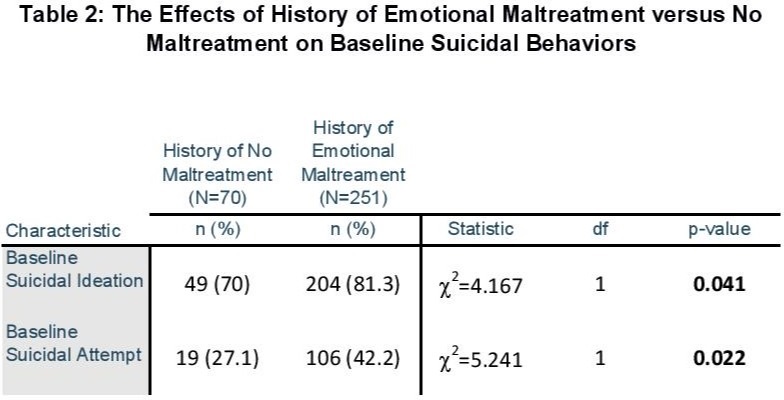Child Abuse & Neglect
Category: Abstract Submission
Child Abuse & Neglect I
219 - Emotional Maltreatment’s Effect on Family Dynamics and Suicidal Behaviors
Monday, April 25, 2022
3:30 PM - 6:00 PM US MT
Poster Number: 219
Publication Number: 219.401
Publication Number: 219.401
Shilpa Hari, Nationwide Childrens, Columbus, OH, United States; Donna Ruch, Nationwide Children's Hospital, Columbus, OH, United States; Farah Brink, Nationwide Children's Hospital, Columbus, OH, United States; Jeffrey Bridge, Abigail Wexner Research Institute at Nationwide Children's Hospital, Columbus, OH, United States
- SH
Shilpa Hari, MD
Child Abuse Pediatrics Fellow
Nationwide Childrens
Columbus, Ohio, United States
Presenting Author(s)
Background: The negative effect of poor relationships with family on suicidality have been shown but not in correlation with emotional maltreatment. This study examined the impact of a history of emotional maltreatment on family dynamics and suicidal behaviors.
Objective: The study objectives were:
1. Compare the baseline and future rates of suicidal behaviors between youth with emotional maltreatment versus youth with no maltreatment.
2. Measure the difference of family dynamics between youth with emotional maltreatment and youth with no maltreatment.
The study hypotheses were:
1. Youth with emotional maltreatment will have higher baseline and future rates of suicidal behaviors compared to youth with no maltreatment.
2. Youth with emotional maltreatment will perceive family dynamics more negatively.
Design/Methods: This prospective longitudinal study had 344 youth aged 12 -15 years with major depressive disorder recruited from a Midwestern children’s hospital and community behavioral health clinics from 2011-2018. Youth and their caregivers completed self-reported questionnaires initially and then at 6 months, 1 year and 2 years. Childhood Trauma Questionnaire assessed emotional maltreatment. Columbus Suicide Severity Rating Scale and Suicidal Ideation Questionnaire evaluated suicidal behaviors. Family Adaptability and Cohesion Scale assessed family dynamics. Reasons of Living Inventory determined family as a reason for living.
Results: Two hundred seventy-four youth (80%) had a history of maltreatment with emotional abuse (61%) and emotional neglect (58%) being the most prevalent. Any emotional maltreatment was endorsed by 251 youth (73%) versus 70 youth (20%) with no maltreatment. Most youth with emotional maltreatment were female (n=174, 69%) and white (n=160, 64%) with a mean age of 13.8 years. Youth with emotional maltreatment had a higher baseline rate of suicidal ideation (p=0.04) and suicide attempts (p=0.02) as compared to youth with no maltreatment, however no difference was found for future suicidal behaviors. Youth with emotional maltreatment more negatively perceived family adaptability (p < 0.001), family cohesion (p < 0.001) and family as a reason for living (p < 0.001).Conclusion(s): A history of emotional maltreatment was prevalent in this sample. Youth with emotional maltreatment had higher rates of suicidal behaviors at baseline and perceived family dynamics more negatively than youth with no maltreatment. Subsequent analyses will measure the effect of family dynamics on future suicidal ideation in youth with emotional maltreatment.
Shilpa Hari MD CVShilpa Hari CV 2021.pdf
Table 2: The Effects of History of Emotional Maltreatment versus No Maltreatment on Baseline Suicidal Behaviors
Objective: The study objectives were:
1. Compare the baseline and future rates of suicidal behaviors between youth with emotional maltreatment versus youth with no maltreatment.
2. Measure the difference of family dynamics between youth with emotional maltreatment and youth with no maltreatment.
The study hypotheses were:
1. Youth with emotional maltreatment will have higher baseline and future rates of suicidal behaviors compared to youth with no maltreatment.
2. Youth with emotional maltreatment will perceive family dynamics more negatively.
Design/Methods: This prospective longitudinal study had 344 youth aged 12 -15 years with major depressive disorder recruited from a Midwestern children’s hospital and community behavioral health clinics from 2011-2018. Youth and their caregivers completed self-reported questionnaires initially and then at 6 months, 1 year and 2 years. Childhood Trauma Questionnaire assessed emotional maltreatment. Columbus Suicide Severity Rating Scale and Suicidal Ideation Questionnaire evaluated suicidal behaviors. Family Adaptability and Cohesion Scale assessed family dynamics. Reasons of Living Inventory determined family as a reason for living.
Results: Two hundred seventy-four youth (80%) had a history of maltreatment with emotional abuse (61%) and emotional neglect (58%) being the most prevalent. Any emotional maltreatment was endorsed by 251 youth (73%) versus 70 youth (20%) with no maltreatment. Most youth with emotional maltreatment were female (n=174, 69%) and white (n=160, 64%) with a mean age of 13.8 years. Youth with emotional maltreatment had a higher baseline rate of suicidal ideation (p=0.04) and suicide attempts (p=0.02) as compared to youth with no maltreatment, however no difference was found for future suicidal behaviors. Youth with emotional maltreatment more negatively perceived family adaptability (p < 0.001), family cohesion (p < 0.001) and family as a reason for living (p < 0.001).Conclusion(s): A history of emotional maltreatment was prevalent in this sample. Youth with emotional maltreatment had higher rates of suicidal behaviors at baseline and perceived family dynamics more negatively than youth with no maltreatment. Subsequent analyses will measure the effect of family dynamics on future suicidal ideation in youth with emotional maltreatment.
Shilpa Hari MD CVShilpa Hari CV 2021.pdf
Table 2: The Effects of History of Emotional Maltreatment versus No Maltreatment on Baseline Suicidal Behaviors

